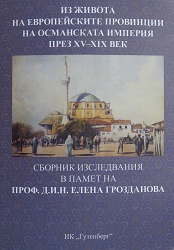Author(s): Charles Ingrao,Lazar Vrkatić / Language(s): English
Neville Chamberlain spoke for millions of his contemporaries when, at the height of the Munich Crisis, he lamented the prospects of going to war over ‘a faraway country’ inhabited by ‘people of whom we know nothing’. The prime minister was, of course, speaking to his fellow Britons about Czechoslovakia. But he could have just as easily used these same words to characterize the Anglo-American world’s knowledge - or concern - about the lands and peoples of the entire region between Germany and the former Soviet Union. A half century later we still know very little about what the Germans call Mitteleuropa, and even less about its history. Even today, as the world press reports recent events in the former Yugoslavia in terrible detail, it has never explained why there is such intense ethnic conflict throughout Central Europe. One tragic consequence of their ignorance has been the incessant, but incorrect allusion to "age-old hatreds" that helped desensitize America’s public and politicians to Slobodan Milošević’s carefully orchestrated campaign of ethnic genocide. We have many excuses. The region's languages are dissimilar to anything we speak. Its multiplicity of intermingled ethnic and linguistic groups challenges the most curious. It boasts no great power to attract our admiration or concern. And, it is not especially strategic or important to us. It may have been only a century ago when Bismarck warned that "the Balkans are not worth the bones of a Pomeranian grenadier", but his advice has guided the statesmen of the West for centuries. But our lack of knowledge or commitment does not mean that we have not played a major role in shaping its past, present, and - as it now seems - future. Although it is true that Central Europe has many endemic problems, the current crisis stems in great part from the West's imposition of its own values and solutions on a region about which it knows little - and cares less. Unfortunately, those in the public sector who mold and make this country’s policy have shown little interest in reading serious historical scholarship. As a result, crucial insights have been lost to the frantic schedules of journalists, who prefer to get their "historical background" from the flip clichés and breezy accounts other journalists. Nor have historical insights gained currency among politicians, who have less time and inclination to read much more than a daily news summary, the requisite opinion polls, and the occasional journalistic account. Thus President Clinton’s memorable remark at a press conference in 1995, in which he justified his belated decision to intervene militarily in Bosnia by proclaiming that he now understood the situation, having just read reporter Robert Kaplan’s Balkan Ghosts. Even those social scientists who serve as area specialists for central Europe have tended to restrict their historical background to the previous generation or two, failing to see how anything that occurred before World War II could possibly inform our understanding of the events of the last decade; hence the broad currency given to political scientist Susan Woodward’s Balkan Tragedy: Chaos and Dissolution after the Cold War, which convincingly ascribes the events of the last decade to a failure of that country’s governmental leaders and institutions, without regard to underlying, historically-informed cultural forces that might have prompted that collapse. The devaluation of history by the public, press, politicians, and social scientists presents a formidable challenge to us as historians. Surely we have a vocational interest in reminding them of our ability to discern the continuity between the past and present as an instrument for determining the likely course(s) of future developments. To this I would add a second, moral imperative to repay the tax- and tuition-paying public that sustains us by contributing to the formulation of public policy. The past decade has exposed us to the tragic alternative. In the aftermath of Srebrenica, Operation Storm and the successful NATO intervention, there has evolved a broad consensus that attributes the war, genocide and the subsequent need for costly, long-term Western intervention to our failure to learn from the lessons of history. I would suggest that part of our responsibility lies in a failure of historians to teach these lessons beyond the narrow confines of the Ivory Tower. Perhaps most remiss have been Habsburg scholars, who have failed to share what they have learned about the multiethnic experience in a "western" institutional environment that upholds the rule of law and codes of professional conduct. To Balkan and Habsburg historians alike, I say that it is not so difficult for a reasonably intelligent person to understand how we have gotten to this terrible juncture in Central Europe, or to envision where we are heading. The answers to our questions are not unteachable, just untaught. Looking over the events of the past decade, I would suggest a number of historically informed insights that bridge the gap between scholarly discourse and the lay public’s self-professed factual ignorance and conceptual confusion.
More...


